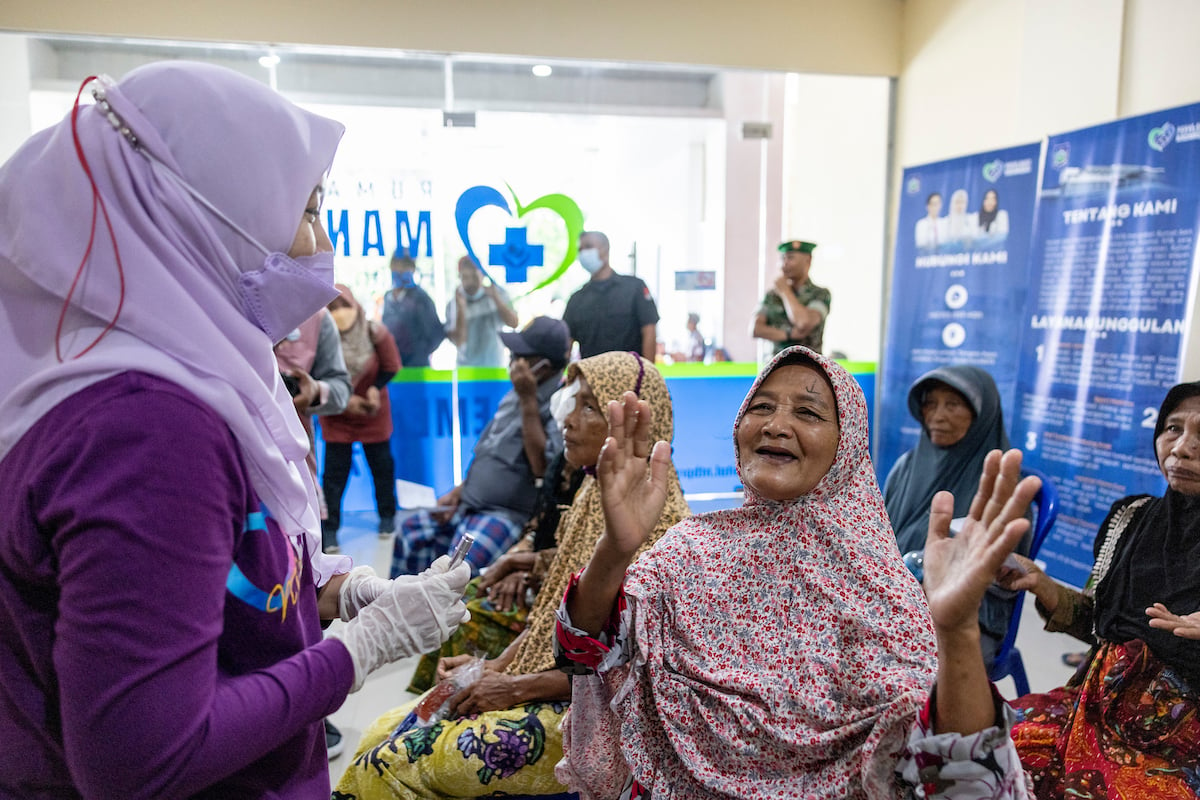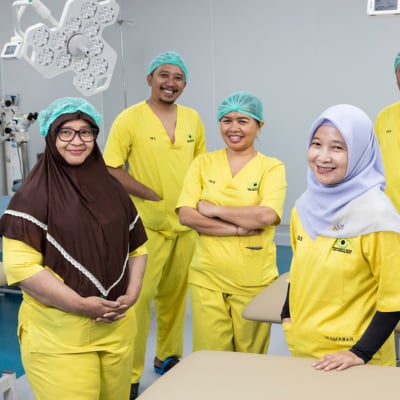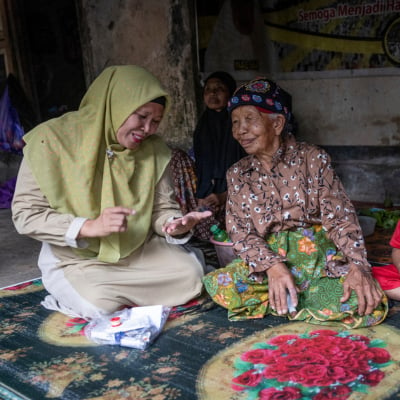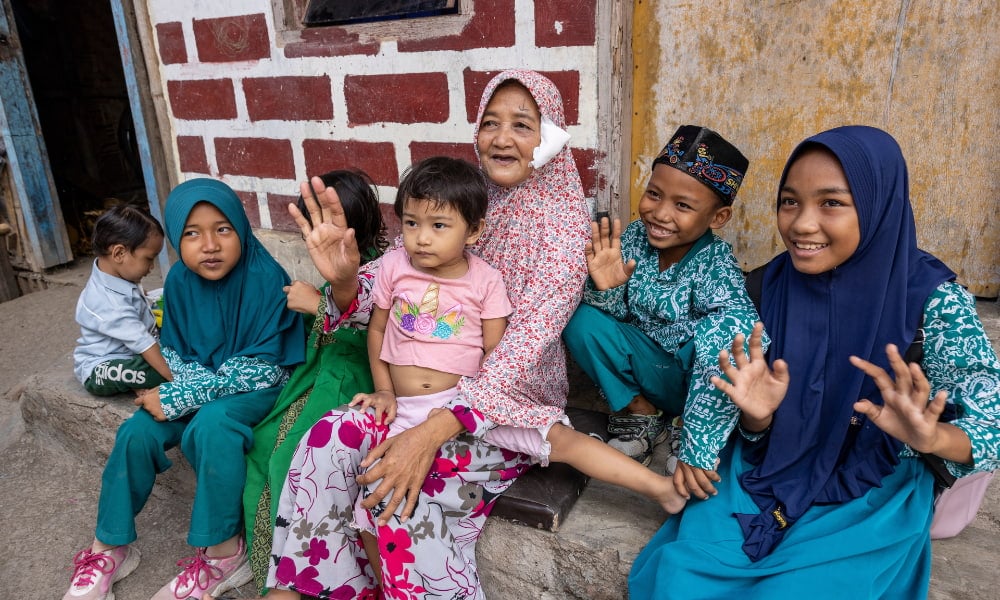Suharni's Story

NO ONE SHOULD LOSE THEIR INDEPENDENCE TO BLINDNESS
Suharni has always been a caring mother and grandmother, rolling up her sleeves to help provide for her large, loving family. Despite being unable to read or write, she has always worked hard to make ends meet and support her family.
But in the last three years her vision rapidly deteriorated. She could see ‘nothing at all’ and relied on her family to help her with the simplest of tasks.
“I need people to help me. I cannot even go to the toilet by myself,” she said.
Suharni’s husband, Budiman, had to give up his work to look after her. Even though her husband was kind and attentive, Suharni longed for her independence. More than anything, she wished she could once more provide for her family and watch her grandchildren grow.
 Suharni’s vision loss meant that she could not walk alone and spent most of her time at home — a huge contrast to her more active years as a worker.
Suharni’s vision loss meant that she could not walk alone and spent most of her time at home — a huge contrast to her more active years as a worker.
This is the harsh reality of avoidable blindness. It does not just take away a person’s sight but their ability to make a living.
Fortunately, a nurse trained by The Fred Hollows Foundation had visited and told Suharni about an eye clinic that would be run at the hospital nearby. Suharni was overjoyed to learn she would be able to have surgery to remove her cataract, thanks to kind supporters of The Foundation, like you.
It was a dream come true — Suharni could have her sight and independence restored. She would no longer need to rely on her family.
Help give more people like Suharni a better future.
SUHARNI’S VISION WAS DETERIORATING
When a nurse trained by The Fred Hollows Foundation visited Suharni in her home for an eye check, Suharni could not even see their hand movements right in front of her eyes.
She was completely blind until someone like you stepped in and made it possible for Suharni to have her sight restored.
INDONESIA HAS THE SECOND HIGHEST RATE OF BLINDNESS IN THE WORLD
While it may seem like eye diseases don’t discriminate, avoidable blindness certainly does. The harsh tropical climate and poverty have meant that the people of Indonesia, on average, suffer cataracts 15 years earlier than people in Australia. But 9 out of 10 people who are blind in Indonesia don’t have to be, and with your kind support, we can change this.
 |
THERE AREN’T ENOUGH OPHTHALMOLOGISTSIndonesia has a significant shortage of ophthalmologists, with only 2,000 ophthalmologists, for a population of over 250 million people. Training and equipping local eye health workforces is crucial to addressing this. |
 |
POVERTY IS A SIGNIFICANT BARRIER TO GOOD EYE HEALTHMost of Indonesia’s ophthalmologists are based in either Java or Bali provinces. This means that affordable eye care is out of reach for millions of Indonesians living in poorer provinces, making them more vulnerable to avoidable blindness. |
 |
THERE IS A LARGE CATARACT BACKLOGCataract is the leading cause of avoidable blindness in Indonesia. Every year, around 80,000 cataract surgeries are performed, but there is still a shortage of about 130,000 people who need surgery but haven't received it yet. The current backlog of operable cataract in Indonesia is approximately 5 million people. The Foundation is working to tackle the cataract backlog by increasing the number of cataract surgeries we perform each year. |

SUHARNI WAS OVERJOYED TO SEE HER FAMILY
As her patches were lifted from her eyes, Suharni couldn’t contain her happiness.
When Suharni went home, there were joyful celebrations. Three generations of her family gathered around her, and she looked again and again at the faces of her grandchildren, some of which she had never seen before.
She had special words for her husband Budiman as she embraced him.
“He is the most beautiful man. I have not seen him for three years.”
Without the support of kind people like yourself, Suharni could have beencome permanently blind. She wouldn’t have been able to see the faces of her loved ones.
Suharni is so grateful that the supporters of The Foundation helped give her precious sight back.
“I feel so relieved and so happy. Soon I will run.”
FRED'S LEGACY LIVES ON IN INDONESIA
Fred Hollows knew that training and building the number of surgeons was the key to fighting avoidable blindness.
Fred passed on his skills to Professor Sanduk Ruit, who taught the Indonesian ophthalmologist Dr Sriana Wulansari. It was Dr Wulansari who performed Suharni’s surgery.
“Teach the teachers first. Then the teachers can teach others.” Fred famously said.
Even though Fred is no longer with us, you are, and we are so thankful for your support. Because of your belief in Fred’s vision, we are still going strong three decades on.
With your support, The Foundation is helping train ophthalmologists. By investing in the training of ophthalmologists, The Foundation is helping ensure the continuity of good eye care health beyond our direct interventions.
"What we’re doing is revolutionary, something big health organisations aren’t doing. They send eye doctors. What we are doing is giving these people the chance to help themselves. We are giving them independence," Fred said.
Fred did not take a ‘fly in, fly out’ approach to restoring sight. He knew that it was vital to train and equip local people to drive lasting, sustainable change in eye health care. He wanted to give people a chance to help themselves.
Like Fred, we believe in the multiplier effect of training — train one surgeon, and they’ll go on to train many more.